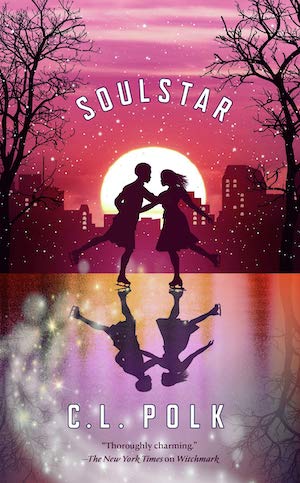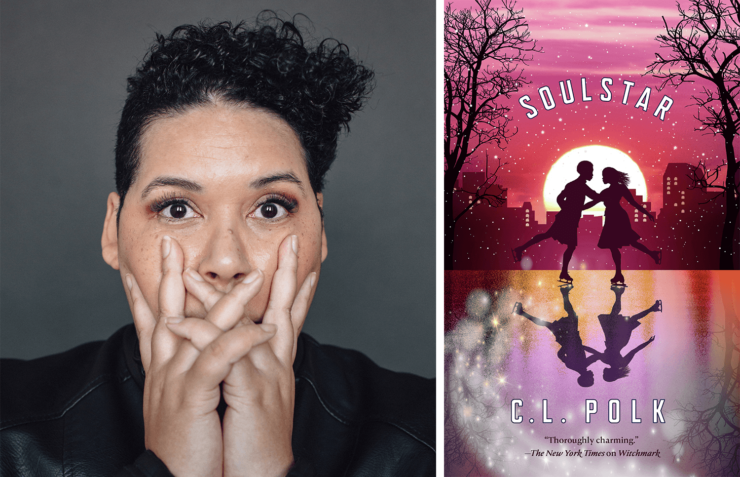Canadian C.L. Polk is a writer and gentlebeing of tact and good taste. The concluding volume of their award-winning Kingston trilogy, Soulstar, has just recently come out, and their The Midnight Bargain was a finalist for the “Canada Reads” television competition. They’ve agreed to answer a few questions today. And I’ve agreed to try not to ask boring ones.
LB: Let’s go broad and social-commentary-ish to begin. Your Kingston books are packed with queer characters and queer relationships. Do you feel the place and portrayal of queerness in science fiction and fantasy media and communities has changed in the last several years, and in what ways? Do you think it’ll change in the next few years?
CLP: I think there are a lot more SFF new releases featuring queer characters and queer relationships now than when Witchmark first came out. I feel that it’s changed, too—there was a time not long ago that any queer characters in a book were either the lone queer secondary character surrounded by straight characters (come on, as if we don’t run in packs. really!) would just be there to support the protagonist (if they weren’t the villain) and maybe die. Then we went through a phase where you could get an SFF story with more than one queer character, but that story was very much an A-plot romance with the expected beats. Witchmark is definitely heavily related to that. The story splits time between a low stakes fanfic style romance and the thematic drama, and I really worried that it wouldn’t do well because it really refused to be one or the other.
These days, I wouldn’t even worry about that for a second. You can write queer SFF all you want. You can choose to focus on a romance, but I don’t think we’re obligated to include a romance plot if we don’t want one. And I think we’re in a space where any kind of queer character can be any kind of role in any kind of plot and it won’t be back-handedly diminished by a critic saying, “This is a real SFF story featuring a character who just happens to be queer!” (I don’t know about you, but I can’t stop the eyeroll at that phrasing.)
I think that change is inevitable but I feel good about the direction of queer SFF—in print, for sure, but I’m really looking forward to another SFF TV series with queer characters front and center, living their most interesting lives while being openly, proudly, kissingly queer, where the relationship isn’t just in the subtext and it doesn’t just suddenly end with someone’s death. (Or yeeting into the void hell or whatever. You know what I mean.)
Buy the Book


Soulstar
LB: Speaking of Witchmark (and Stormsong, and no doubt Soulstar and The Midnight Bargain), your work takes a rather subversive attitude to… let’s call it the traditional patterns of authority and legitimacy in fantasy. For example, instead of restoring a monarchy (or replacing a bad monarch with a better one), there’s much more of a revolutionary argument in play, one as (or more) interested in reparations as reconciliation. Tell us a little bit about your choices there?
CLP: I admit that I love the glamour that is part of the very fabric of being a monarch. It’s a really seductive archetype, isn’t it? The idea that one person was born and then trained their whole life to become the ultimate authority over a nation, to be more of a symbol than a person, and the… I’m just going to say it. The brand management. Oh wow. Talk to me about Elizabeth I. I get the allure, I really do.
But kings are wrong. When you take away the clothes and the mystic and the glamorous accident of fate that makes a monarch, then you have to look at their policies and their laws and the sum of their actions, and then you see that they’re merely about maintaining a status quo that makes them and the people they care about comfortable, and everyone else is simply there to serve their interests.
I know this sounds like more than just monarchy. There’s a reason for that. Just about every large-scale organization of people and resources shakes down to a few guys at the top getting everything served to them by the people down below. And there’s got to be a better way—I mean it might suck as far as the kings and oligarchs are concerned, but dang I do not care. We’ve got to stay unsatisfied. We must keep trying to find a better way to be a people.
So if I believe that, if those are the values I uphold, if I really want a better future, how could I just chuck that over my shoulder and not scrutinize these kinds of power structures just because I’m writing fantasy? Of course I’m gonna do that. That’s the fun of it!
LB: Speaking of brand management, what’s it like with you and your work in the public eye with The Midnight Bargain involved in the “Canada Reads” television show competition? Have you had to make any changes to how you present yourself online? (In any other year, I would add “and in person”, but given the year that’s been in it…)
CLP: I never really expected to be anything more than an obscure writer when I started this. I gained more recognition than I thought I would, but it was happening at a manageable pace. I felt like I could handle it, but I’ll be honest—I already wanted to stop answering strangers who asked, “So what do you do?” with the truth, because the potential consequences of telling the truth are more than I feel equipped to handle.
And then Canada Reads happened. Oh, wow. Suddenly I was a lot more visible than I had been, and it happened so fast. I really felt I was losing my grip. But then DongWon Song published an article on their SubStack that was so perfectly timed, it felt like it had come to rescue me. (Read it here.)
What I appreciated the most about DongWon’s article was how It helped me think about why all this notice was bothering me so much, and how I could change how I show up in public internet social spaces. I took the opportunity to think about what it means to be a brand as opposed to having a brand, and oh boy I wish I had known more about this angle of it sooner. Most of the material about branding is centered on getting people to notice you. It doesn’t say very much about what the heck you do after you accomplish that!
So yeah, I’ve recontextualized what I say and do online. I am conscious that many more people are looking at me now. And while I have nothing to offer those who are there to hate and judge me, I think much harder now about what I say and who might hear me and how it might hurt them if I’m careless or just trying to get a dunk on someone for laughs. I mean I was thinking about it before, but I really, really want to make sure I don’t make someone vulnerable have to tell themselves that I didn’t really mean it that way. It doesn’t matter what I meant. It matters that they are hurt. So I’m stepping into a more responsible way of presenting myself.
LB: Let’s wander sideways a bit for the next question, and talk about what you’re reading (or what you’d like to): who are some of the other people doing interesting, exciting work in fantasy and science fiction right now? What sorts of stories do you (or would you) like to read or watch? Are they different or similar to the sorts of stories you (want to) create?
CLP: I have a whole wish list of books I want but don’t currently have in my hands. I’m hoping to get a better look at what Epic Fantasy is doing right now. I really need lighting to strike my internet junction box so the distraction machine just won’t work and then I can read these books. After I have a crisis about what to read first, of course.
I am very happy about Jordan Ifueko, Bethany C. Morrow, and Rebecca Roanhorse’s recent works. My next audiobook is a debate between Legendborn and The Echo Wife. My bookpile has A Desolation Called Peace and Fireheart Tiger. I’m supposed to re-visit Seeing Like a State for a group read starting soon. I need an internet intervention.
As for watching shows? I’m so curious about The Wheel of Time. I cannot wait to watch it. usually I just ignore what’s currently happening on TV but I really am excited. It was a huge part of my history as a fantasy reader, and it was part of the motivation to become a fantasy writer—both because I loved it, and because I was frustrated by it.
LB: Seeing Like A State is such a fantastic piece of analysis. I’ve enjoyed every bit of James C. Scott ever since I first came across it—recommended by Max Gladstone, I think.
Speaking of the Wheel of Time—can you tell us a bit more about your history as a fantasy reader and your motivation to become a fantasy writer, that combination of love and frustration?
CLP: I loved fantasy. I liked science fiction a lot, but I really loved fantasy. it woke something up in me. I loved imagining a world where things were different.
And they were! But…
Okay. I was a little bit insulated from how fantasy was… Well, let’s put it frankly. Sexist, because I had sort of fallen into reading books written mostly by women. I didn’t totally escape sexism, but I had a softer ride. But honestly, fantasy really sat comfortably in a position that people claimed was apolitical purely because it served the comfort of able heterosexual white men with capitalist values. And I didn’t have the words I needed to express my dissatisfaction with that assumption about who was supposed to be served by fantasy stories, but I knew I wanted something different. Like what Joanna Russ was talking about, but more… even if i didn’t have the words for what “more” was to me.
It took years of writing to figure out a piece of it, and my figuring it out is reflected in the books I have written so far.
LB: Last question: any tips for writing during a global pandemic?
CLP: I have no tips. I haven’t written anything since it started. I thought I had, but the novelette I managed to eke out was written before the Isolation started. I did try to write more than that but it was all hot garbage. So I guess my tip is, if you can’t write at the moment, you’re not alone.
Liz Bourke is a cranky queer person who reads books. She holds a Ph.D in Classics from Trinity College, Dublin. Her first book, Sleeping With Monsters, a collection of reviews and criticism, was published in 2017 by Aqueduct Press. It was a finalist for the 2018 Locus Awards and was nominated for a 2018 Hugo Award in Best Related Work. She was a finalist for the inaugural 2020 Ignyte Critic Award, and has also been a finalist for the BSFA nonfiction award. Find her on Twitter. She supports the work of the Irish Refugee Council, the Transgender Equality Network Ireland, and the Abortion Rights Campaign.










